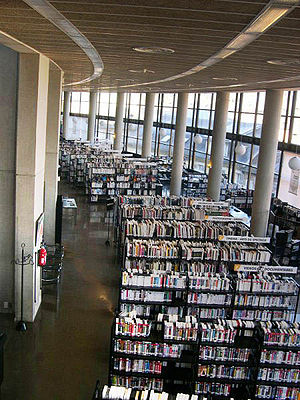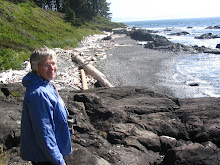 Image by tmib_seattle via Flickr
Image by tmib_seattle via Flickr
I joined Facebook more than a year ago. I have mainly used it to connect with people I went to school with in the past and with my family members. Over the past year, Facebook has added extra features that I haven't used very much. I am careful about what I post to my Facebook site. It does not feel like home. On the other hand, my blog is starting to feel like home. I have personalized my space there to display what is important to me. For one to one communication, I still prefer to use email (I have a professional email account and a personal email acc
 Image via Wikipedia
Image via Wikipedia
Senior citizens are beginning to use Facebook to connect with friends and family. I just added my 85 year old uncle who lives in Ottawa to my friend list. He and his daughter just took a trip. She posted some photographs on Facebook so that I was able to immediately see my uncle and some cousins that I haven't seen in person for several years. Yesterday I sent my sister birthday greetings on her Facebook account. My sister posted a song and video on her Facebook site in honour of her birthday. I went to YouTube to watch the video.
 Image via Wikipedia
Image via Wikipedia
When I think about how the various generations use Facebook, I have many questions about how and why. Lee Rainie of Pew Internet and American Life Project presented an excellent slideshare presentation in March 2009. This slideshare is valuable because of his demographic breakdown of the various age groups and their reasons for using technology. Then he proposes ways in which the library can meet the needs of the patrons in their use of technology. He believes that libraries can become nodes in people's social networks. (Note: This presentation is aimed more at librarians working with adult patrons. However, I believe there is value here for educators as well. Some schools may wish to open the doors of the school to invite adult learners to use the library or the computers. At my school, we held Adult Computer Classes as part of our community outreach. Those seniors who continue to pay into property taxes that fund education can be given something in return.)
I found 25 Things You should know about facebook, which made some good suggestions about developing your Facebook identity. It suggested using a current profile picture. Even if your settings are on privacy, visitors will still view your profile picture. Recently I updated my profile picture and did receive some positive comments from my Facebook friends. In describing who you are on Facebook, list interests that best differentiate you. Rather than saying "I like pets" say "I like a soft cuddly Dwarf Netherland bunny who likes to thro
 Image by greefus gone via Flickr
Image by greefus gone via Flickr
Back to the list of 25 things to do; it's O.K. to deny random friends' requests. Write on your friend's walls. Don't give personal information (phone numbers), anything too personal or incriminating. Use email for those messages. (Another suggestion list I came across suggested using email for any personal messages. There is a private message feature on Facebook. I think it depends which avenue of communication your friend prefers. One of my friends doesn't use email anymore so I would have to send her a message on Facebook.) Use the privacy settings effectively to shield and protect yourself. This is an area that I need to change. When I set up my Facebook account, I set it with full visibility to the world. I need to change it so that only accepted friends will see my profile when they first arrive at my Facebook account. At the moment it is totally open so feel free to request to be my friend (as Heather has already done). Just go to Ruth Elliott and look for my profile picture. I am wearing a flowered top.
Continuing from the 25 things, realize that potential employers and even colleges could be checking out your Facebook site. You could also have husbands, wives, boyfriends, and girlfriends checking out your site. Recently on the news, it was reported that a celebrity discovered from their dating partner's website that the two of them had broken up. The status said, "Available or single". One of my students told me recently that the family was moving but without the Dad. She said, "Dad found out that Mom was breaking up with him. It was on her Facebook account."
At the 25 things location, it suggests that you provide interesting status updates from time to time. The above is the kind of interesting update that you wouldn't want to see if you were dating the person.
There are some gadgets or special use features that can be added to your Facebook page. You could use I Like at http://www.facebook.com/apps/application.php?id=2413267546&ref=pr to add music to your facebook page. You can dedicate songs to your friends. You could embed the Where I've Been feature on Face book http://www.facebook.com/apps/application.php?id=2603626322&b&ref=pd You can enter all the countries and places that you have traveled to. Then a map is created to show where you've been.
At this point in time, I have updates from Facebook feed directly into my personal email account. I check my email every day but rarely look at my Facebook account. Later on, if I become more active on Facebook, I can change the settings on the feed to my email account. You can find out how to do that at this site--http://www.switched.com/2008/11/13/facebook-101-25-tips-and-tricks-26/.
Recently I attended a surprise retirement party for a teacher. This teacher had impacted so many lives over his years of teaching. The organizers created a Facebook group called some non-descript name. (This teacher was not active on Facebook.) Then they sent out invitations to the people they knew and asked them to contact other people. All three of our children were taught by this teacher in the AcTal (Academically Talented) program. The organizers asked for the invitation to the party to be spread far and wide. On the day of the party, about 200 people came to the party--most contacted via Facebook.
For me, Facebook has its place in my social use of the internet. Its place is as a gathering point for people I know personally. Will Richardson looked at the difference between social networks and social tools in a blog entry in January 2008. He believes that social networks do not have a place in schools while social tools do have a place. (Would this be tools to upload pictures, take the photographs in the first place, upload video, write messages, and create interesting descriptions of your interests?) Richardson says,

When I return full circle to the Six Degrees of Separation idea, I think about bringing together an individual I have met through a book that he authored and an individual I have met in person once and seen on television many times. Terry Fallis is the author of the book The Best Laid Plans which I read recently. Terry must have some kind of search program which tells him when he has been mentioned on a blog post. Terry's book was first created (after initial writing and rejection by book publishers) as a podcast (so I mentioned it in my podcast blog post.) He discovered (somehow) that I had mentioned his book in my blog post and commented on my blog post. Since then I read Terry's book (which is awesome and funny and sad and hilarious; a must read for all Canadians) and commented on my Twitter site about reading it. Terry again found that comment and commented back to me. Then he began to follow my tweets and I am following his as well. This is a totally online, networking connection.
As I have been on my road trip (looking at real clouds, you know, rather than just computing in them), I have been thinking about getting Terry Fallis and Brent Butt together. Brent Butt is the creative genius behind Corner Gas, a comedy T.V. show set in Saskatchewan. I met him once at the Saskatchewan Centennial Gala. However, my husband knows an actor, Linden Bray, who had bit parts on Corner Gas from time to time. I'm sure that via Linden I could get in touch with Brent Butt. I would suggest to him that he read Terry's book because I could see potential there for a comedy series or a movie. Therefore I would use my networking powers for good to bring more Canadian comedy to the small screen. S
Six degrees of separation? Maybe with the power of social networking, it is more like three or four degrees of separation.
References:
Richardson, W. (16 January 2008) Social networks (no) vs. social tools (yes) in schools In Weblogg-ed. Online at http://weblogg-ed.com/2008/socail-networks-no-vs-social-tools-yes-in-schools/
![Reblog this post [with Zemanta]](http://img.zemanta.com/reblog_e.png?x-id=7f929dd3-b21a-47e8-b404-6f627bade11f)





Six degrees of separation is an interesting perspective. Obviously, there isn't much distance between us all, yet there are so many lonely people in the world. I wonder why?
ReplyDeleteThanks for the link to "25 Things You should Know about Facebook."
Lori